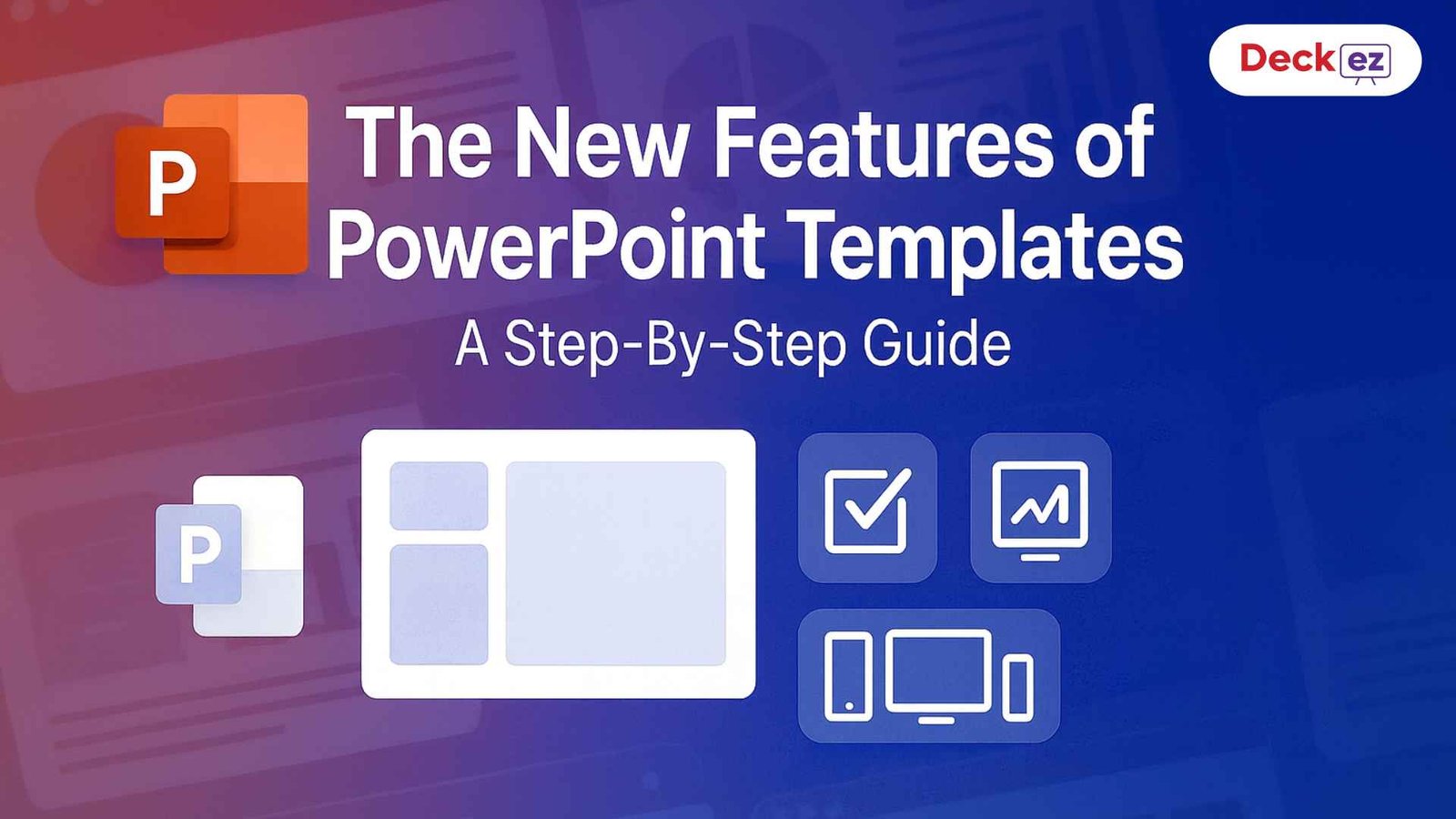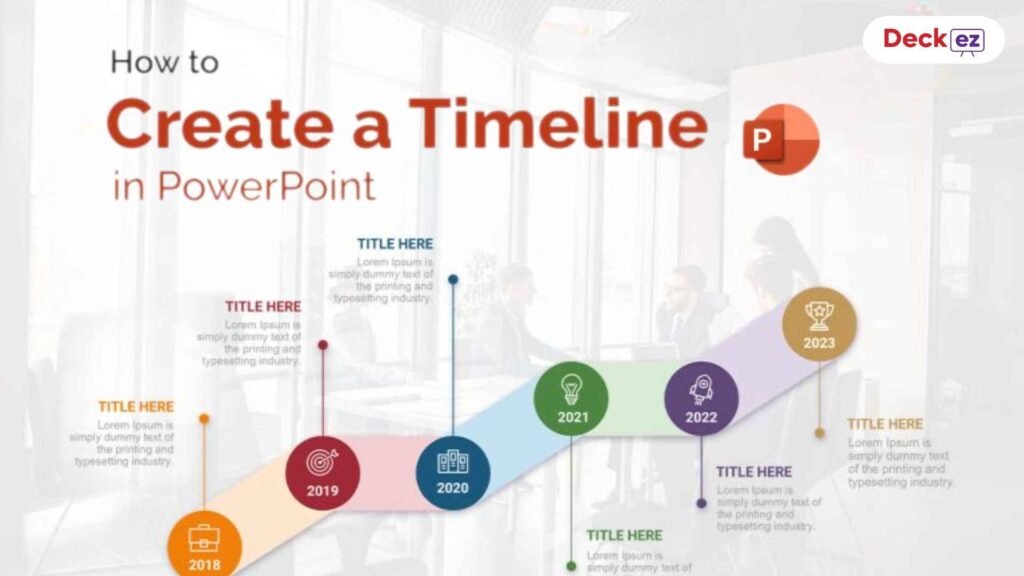From business to education, PowerPoint is still the go-to software for creating effective visual presentations. Microsoft is constantly improving PowerPoint’s capabilities, and new PowerPoint templates take slide design to a whole new level. These new templates can save you time, promote brand consistency, and bring ideas to life through visual storytelling and automation. Newer PowerPoint templates will assist you in creating professional, high-impact presentations faster, no matter whether you are a business leader or a designer for a presentation design firm.
In this tutorial, let’s walk through some new features in Ultimate Guide PowerPoint, how these make your workflow easier, and how you can use them step by step.
1. Smarter Design with PowerPoint Designer
PowerPoint’s Design services feature is one of its smartest tools. This means it uses AI to give you a clean and professional layout for your slides as soon as you add images, text, or charts.
Here’s how to use it:
- Head to Home
- Click Design Ideas
- Choose the layout you like from the options
This function is made for you if you’re not a designer and want fast, fresh, modern slides, but even presentation design agencies will use it to create initial concepts quickly, before customising them further.
2. Built-In Brand Customisation Options
Several teams are often involved in creating presentations, so it is crucial to maintain brand compliance, alignment, and consistency. Previously, this required manual work to ensure consistent colours, typefaces, and logos, but now, PowerPoint’s Slide Master makes this easy. Utilising one template can be used over and over again, which allows you to set logos in place and swap out typefaces and brand palettes along the way. Presentation design companies can build and change templates to help keep each deck branded and visually consistent.
Setup steps:
1. Go to View → Slide Master.
2. Personalise fonts, colours, and placeholders.
3. Save the file as a .potx template.
4. Share with your team for company-wide use.
This update establishes a shared design system across departments, promoting collaboration and uniformity in corporate narrative.
3. Dynamic Content with Interactive Features
PowerPoint templates have evolved from simple static slides to include interactive features, including clickable menus, collapsible sections, and video and audio embedded into the presentation.
Interactive features may include:
- Slide navigation using action buttons
- Hyperlinked icons
- Videos are embedded.
- To animate, click.
Advanced templates are designed to bring presentations to life and allow the presenter to engage the audience with a live demonstration or images.
4. Data Visualisations Using Real-Time Charts
Data storytelling is becoming increasingly crucial in business, and PowerPoint’s smooth connection with Excel allows for real-time updates. Any changes made to the linked Excel file automatically update within the charts—without any manual replacement.
Steps to creating a live chart:
- Insert → Chart
- Choose the Type of Chart
- Click Edit data to embed Excel
- Any changes made inside the Excel file instantly update in PowerPoint.
5. Cloud Integration and Collaboration
PowerPoint’s connection with Microsoft 365 and OneDrive makes collaboration easier as remote work grows in popularity. Teams can co-edit presentations simultaneously and share comments instantly.
How to Collaborate
- Save the file in OneDrive or SharePoint.
- Click “Share” to invite your team.
- Use Comments for notes and ideas.
- This makes collaborating faster, easier, and more effective.
6. Adaptive Templates for Different Devices
- Presentations today need to be usable on a laptop, tablet, and phone. Modern PowerPoint templates now feature adaptive layouts that resize seamlessly across devices without compromising design.
- Designers can easily preview their slides in aspect ratios (4:3, 16:9, and vertical) to ensure they will look great during meetings or pitches, whether in-home or in-person.
Pro tip:
Always test your template in multiple aspect ratios, and especially double-test decks you’ll provide to a presentation design service, when creating a deck for both live and digital events.
7. New Animation and Transition Libraries
PowerPoint’s Morph Transition is so much more than simple fades; it helps you create smooth, fluid movement between slides with a cinematic touch. The best thing about the Morph Transition is that it recognises similar objects in the slide and animates them in a natural way that tells a story over two slides.
How to utilise Morph:
- Copy a slide
- Move, resize, or recolour objects
- Click Transitions → Morph → Apply
- Preview the Morph Transition
When used well, Morph provides a much more polished and story-driven flow to your presentations and is a hallmark of excellent presentation design above and beyond the basics.
8. Accessibility and Inclusive Design
Accessibility now plays a big role in PowerPoint’s template refresh. The new Accessibility Checker scans presentations for readability and usability issues, such as missing alt text or poor colour contrast.
To access:
1. Go to Review → Check Accessibility.
2. Follow the suggested fixes.
These tools help you to ensure any presentation is inclusive, supports a diverse audience, and is in compliance with international accessibility standards. The feature has become indispensable for government agencies, educational institutions, and corporate organisations.
9. AI-Driven Speaker Coaching
Another great feature is Presenter Coach, which uses AI to analyse your speaking pace, tone, and usage of filler words in real time. After you have your rehearsal, it will then generate a report to refer to for improving your delivery style.
Working with a presentation design company, which also offers coaching on top of creating slides, can certainly help professionals produce confident posters in both visual and verbal presentations.
Effective Use of New Features: A Step-By-Step Process
Step 1: Select a Contemporary Template
Pick an element and choose a contemporary template—such as those from SlideEgg, Slides Carnival, PowerPoint, or any professional presentation design company like Deckez, Slide Genius.
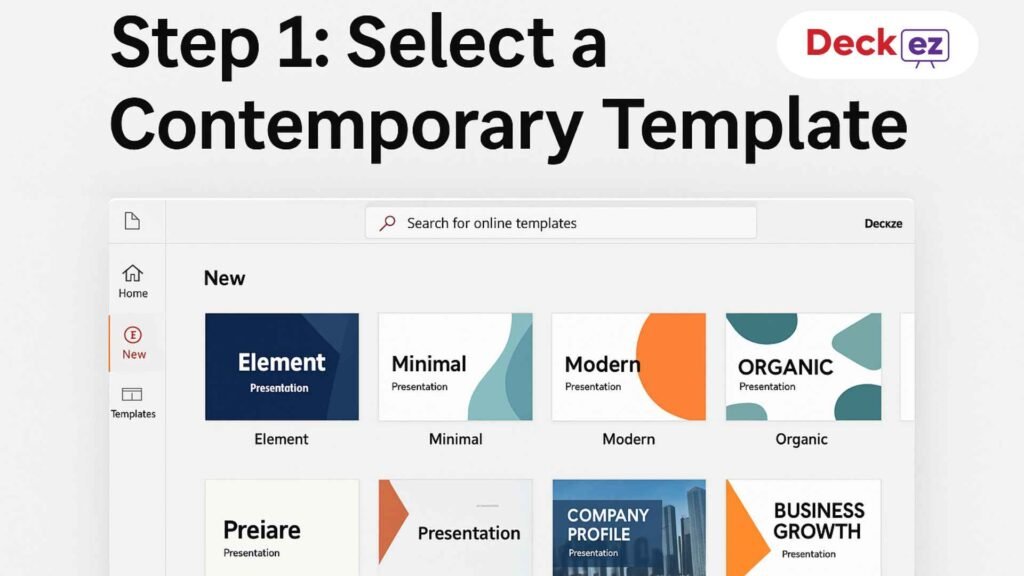
Step 2: Add Content First
Put down your text before stylising. This will allow PowerPoint’s AI to better fit its picture suggestions.
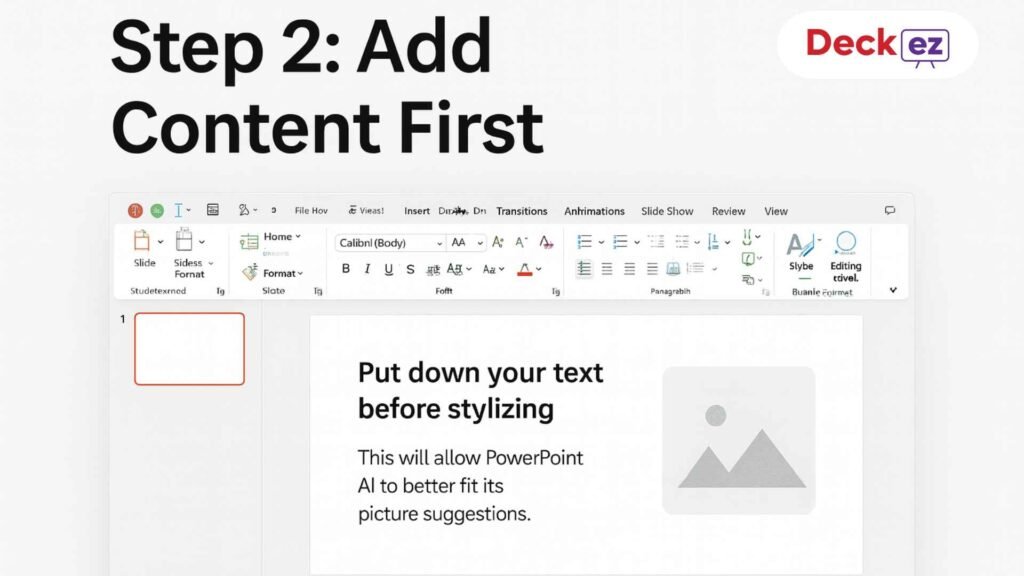
Step 3: Try out Design Variants
Use the different variants of the design until you find a colour palette that fits your idea.
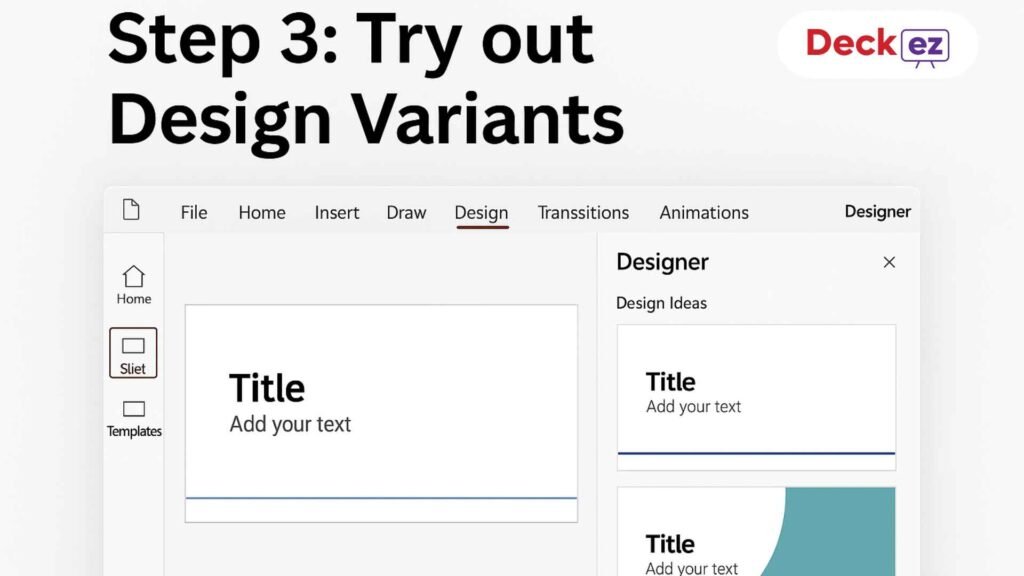
Step 4: Update Default Images and Icons
Easily update images with a drag-and-drop. Update the icons to clarify your ideas
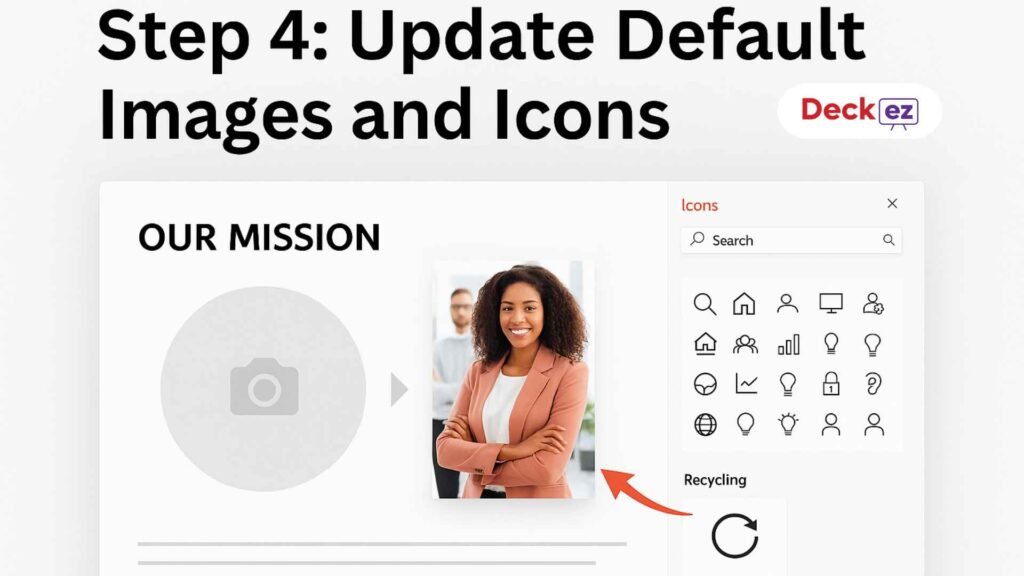
Step 5: Use Smart Infographics
Graphs, schematics, roadmaps, or statistics will create information in digestible formats.
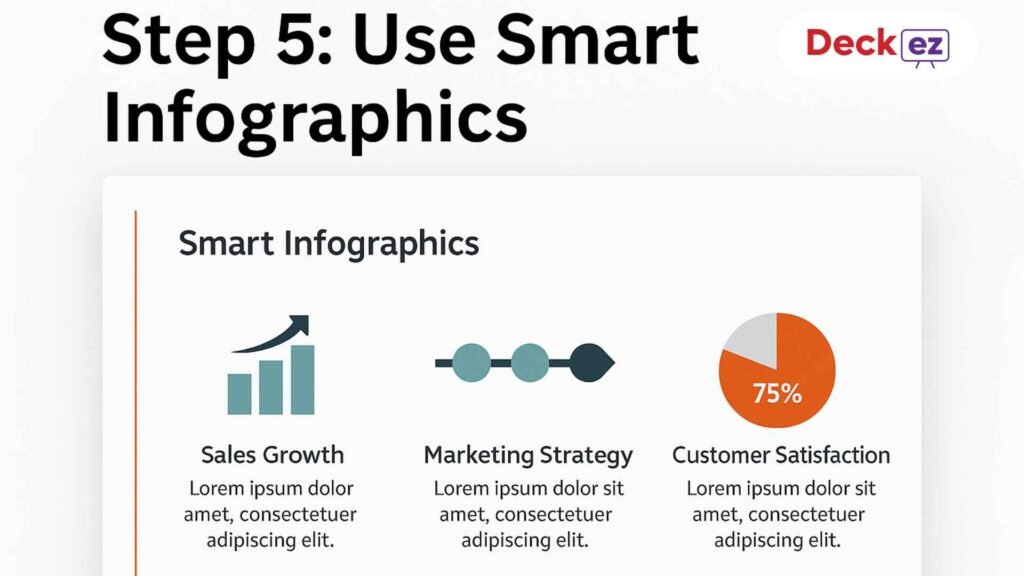
Step 6: Add Small Animations.
Use Morph, Fade, and Wipe to avoid too many animations.
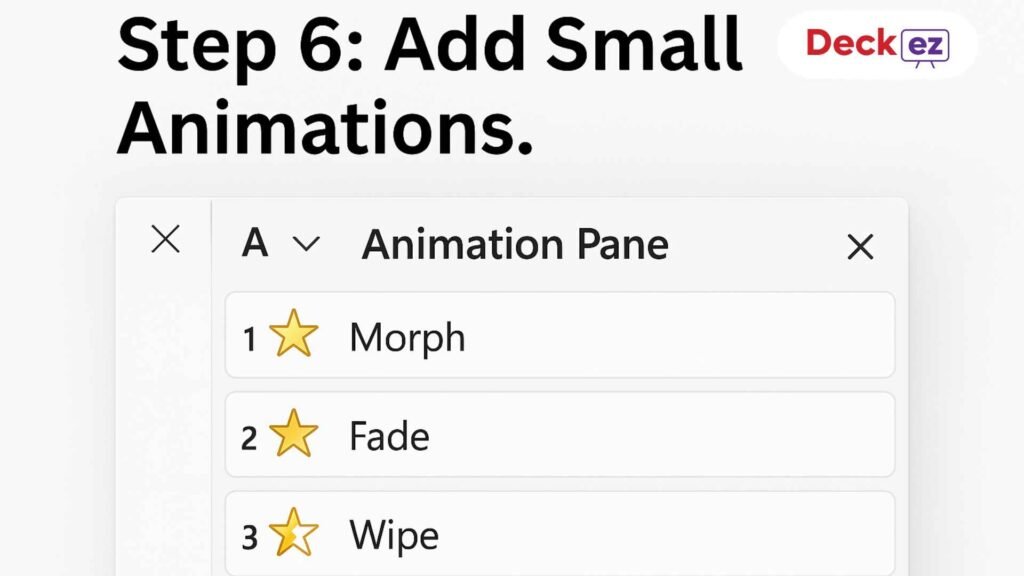
Final Thoughts
Modern PowerPoint templates combine automation, smart design, and practical collaboration to streamline your process and present polished presentations. Your slides provide opportunities to add depth and be strategic in your thinking with AI suggestions and the ease of brand-ready customisations. Collaborate with a presentation design professional to enhance the clarity and effectiveness of your slides. The presentations of the future will foster the experience of immersive communications to inform, persuade, and inspiring.
FAQ
1. What’s new in PowerPoint templates?
Smarter layouts, AI-driven design ideas, and modern visuals make creating slides much easier.
2. Do I need design skills to use these new templates?
No—PowerPoint’s AI and preconstructed layouts walk you through it effortlessly.
3. Can I customise the templates?
Yes, you can change colours, fonts, and branding with just one click.

